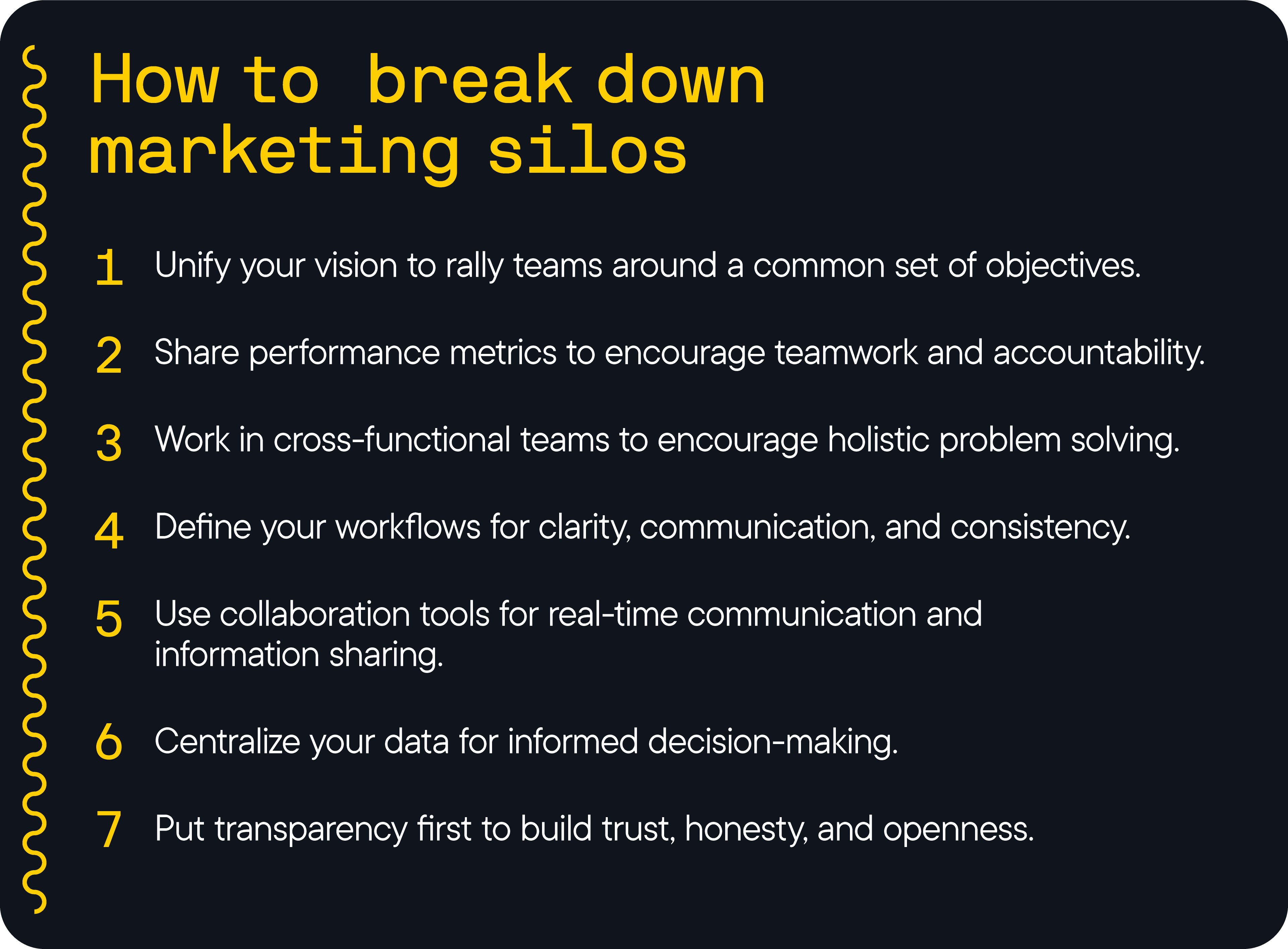Guide for CMOs: How to improve team alignment as a marketing leader


As a marketing leader, it's on you to create a unified, collaborative team that contributes to not only marketing successes, but business success as a whole. After all, misalignment is not only unproductive, but expensive.
But, it's time for a reality check: simply adding in more regular team meetings is not the answer to better team alignment. In fact, doing that is no good for anyone - and don't you know it.
And no, simply stating "let's align on this" at the end of that Zoom or Teams call isn't going to cut it either.

In this (super) quick guide to improving team alignment, you'll find out:
- What team alignment really takes
- Why the effort will pay off in any campaign or end-of-quarter results
- How to improve alignment - both within your marketing team and cross-functionally
What is team alignment?
Team alignment is more than just weekly catch-ups, you bringing something to the leadership meeting, or just getting everyone to nod along with you. It runs a lot deeper than that.
It's about creating a shared vision, understanding and purpose that drives your entire marketing function forward.
To get this well-oiled marketing machine, you've got to think about things like:
- Strategy: Business and marketing goals
- Performance tracking: Metrics and KPIsGood vibes
- Resources: Role allocation, priorities and training
- Collaboration: Processes and workflows
- Communication: Various channels and frequency
- Technology: Tools and martech stack
- Good vibes: Team culture and values
Why is team alignment important?
Okay, so what's in it for you as a marketing leader, for your team, and for your business? Well, let us tell ya - because we think you'll be interested.
Better employee engagement
When team members feel connected to the broader mission or the bigger picture, they're proven to be more invested, motivated, and passionate about their work.
Next-level collaboration
Aligned teams break down silos, communicate (way) more effectively, and both leverage and learn from each other's strengths. We love to see it.
Less blockers in the mix
While we can't make standard marketing pet peeves and blockers disappear completely, improved team alignment does help with input and feedback processes.
Increased productivity
Clear direction and shared goals means you and your team waste less time on misunderstandings, miscommunication, and mismanagement. Instead, you spend more time driving results.
Unmatchable creativity
A sense of unity encourages teams to bounce ideas off each other, challenge assumptions, and innovate together. And you can wave goodbye to creative burnout, too.
Faster decision making
With a shared understanding across your team, you'll see decision will not only be make quicker, but more confidently too. Endless debates and confusion, be gone. 👋
More flexibility and agility
The more aligned your team is, the easier it is for them to pivot and respond to organizational changes or trends rapidly and effectively.
How do you know if your team is unaligned?
There are warning signs your marketing team isn’t working effectively. Keep an eye out for these red flags: content that’s quickly forgotten instead of reused, teams working in silos with little visibility into each other’s projects, and a scattered tech stack that slows everyone down. If your marketing goals don’t align with business objectives, or there’s no central hub for content, it’s time for a change. Inconsistent publishing and unclear metrics also point to a deeper issue. So let's get into how to fix this!
Optimizely is a 8x Leader in CMPs!
How to improve team alignment: A strategic approach
-
Set shared goals
Develop clear, collective objectives that everyone understands and can rally behind. Make sure these goals are specific, measurable, and (actually) mean something to each member of the team. -
Communicate openly
We know we always say it but... communication is key. Create channels for transparent, honest communication, and plan regular all-hands meetings, open forums, and accessible leadership. -
Plan regular check-ins and retros
Schedule consistent team meetings to review progress, discuss challenges, and celebrate wins. Don't forget retrospectives at the end of each quarter and year to help teams continuously improve and learn from experiences. -
Foster a culture of trust
Here are a few steps you can take to foster a culture of trust within your marketing team:
🤝 Lead by example: Show vulnerability, admit mistakes, and demonstrate authentic leadership.
🤝 Create psychological safety: Ensure team members feel safe to speak up, share ideas, and take calculated risks.
🤝 Invest in team development: Provide training, mentorship, and growth opportunities. -
Shout about achievements
Recognitions boosts morale and reinforces collective success. So, no matter how big the win is, make sure you celebrate both individual and team successes where you can. -
Encourage collaboration
Team alignment is all about collaboration, but you need to create opportunities to spur it on too. Create cross-functional projects, collaborative workshops, and team-building activities that break down departmental barriers. -
Use the right tools
There are way too many martech solutions in the world, but not all of them will be right for your team. Do your research, and invest in collaborative project management tools that facilitate communication, track progress, and keep everyone aligned. -
Break down marketing silos
Basically, break 👏 down 👏 those 👏 traditional 👏 silos. They're kinda boring now anyway.

How to achieve cross-functional alignment
Because we're all realists here, we know that alignment within your marketing team is one thing... but is the rest of the company aligned with you?
Here's how to focus on alignment with other departments:
- Regular inter-departmental meetings
- Shared OKRs (objectives and key results)
- Joint problem-solving sessions
- Clear communication channels
- Mutual understanding of each department's goals and challenges
Use these tactics to break down traditional silos that don't really get us anywhere, shout about all the good stuff that marketing has going on and in the pipeline, and get relevant input more swiftly.
Always look to improve and iterate
Team alignment isn't a one-time project—it's an ongoing commitment. It requires consistent effort, genuine leadership, and a genuine belief in the power of collective success.
By implementing these strategies, you'll transform your marketing team from a group of individuals to a high-performance, aligned, and integrated powerhouse that can tackle any challenge thrown at them.
Get ready for a bigger, badder, more integrated marketing team
And the award for the best alignment strategy goes to... an integrated marketing strategy and holistic approach to work. 🏆 By creating an overarching strategy that connects every aspect of your marketing efforts, you naturally drive alignment and therefore, make everyone's lives easier (including your own). Leading your team with an integrated marketing approach ensures that:
- Everyone understands the bigger picture
- Individual efforts contribute to collective goals
- Communication flows seamlessly
- The team moves as a unified force
- Interactions with other teams are nothing but useful

